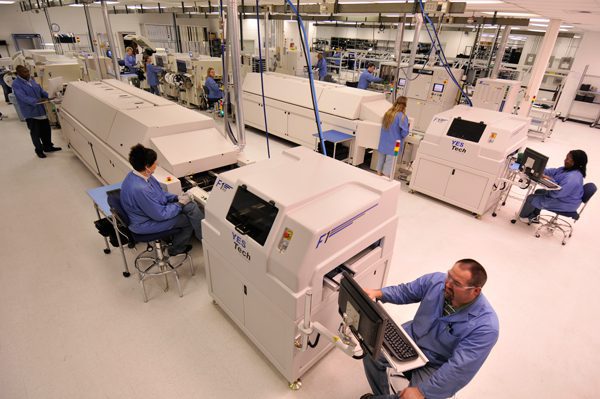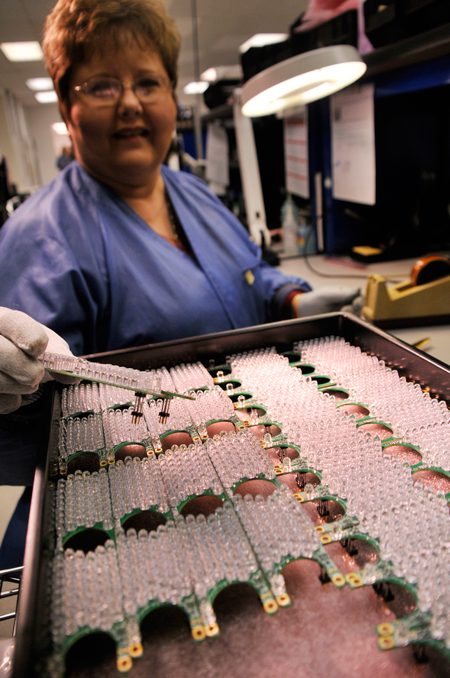Advanced manufacturing: Economic lifeline?

“In 1965, if you had a good back and a good alarm clock, you could make a good living in Milwaukee,” Mayor Tom Barrett told a recent Raleigh conference, because of the strength, at the time, of that city’s manufacturing sector.
Although rural Stanly County is very different, that Milwaukee attitude was also the prevailing sentiment of many of my friends and high school classmates, growing up as we did between the steady hum of Albemarle’s textile mills and the roaring furnaces of Alcoa’s aluminum plant in Badin.
Born in the 1960s, ours was a generation raised on the certainty of manufacturing jobs as a way to make a decent living, and at the Northern-based, unionized Alcoa, even a “good living.”
But the two decades that awaited North Stanly High School’s Class of ’83 were anything but certain. The promise of manufacturing as an economic lifeline was replaced by startling economic decline and insecurity for the small towns and rural communities of the southern Piedmont. Manufacturing jobs were lost to “off-shoring,” where costs, primarily labor, were cheaper. Factory modernization reduced the demand for labor. As my colleagues at the institute have documented, several counties in the Charlotte region that had high percentages of manufacturing employment in 2000 have experienced some of the highest unemployment rates in the region since 2008. By 2003, most of the textile plants in Albemarle had closed, and Alcoa’s Badin Works sat silent.
|
Want to read more?
|
With this historic narrative as a backdrop, more than 1,000 political, economic, academic and policy leaders gathered in Raleigh in early February for the 28th Emerging Issues Forum to discuss the future of manufacturing in North Carolina. The annual event, founded in 1985 by N.C. State University and former N.C. Gov. Jim Hunt, has become one of the most important policy forums in the state, tackling issues as diverse as education, tax reform and health care.
After recent years in which the forum explored such topics as “creativity” and “generation Z,” there was something decidedly old school about this year’s theme – manufacturing. However, for those expecting a retro discussion about North Carolina’s traditional manufacturing sectors and 1970s-era industrial recruitment, this was clearly not your father’s manufacturing conference. Rather than sessions on industrial site selection and bonds for site improvements, participants heard about futuristic-sounding topics like Wake Forest’s leadership in regenerative medicine and the “growing” of new human organs, and the potential of 3-D printing to revolutionize manufacturing.
The term used throughout the forum was “advanced manufacturing,” commonly (and casually) used by today’s economic development officials, but perhaps unfamiliar to community leaders more versed in terms like high-tech vs. low-wage/low-skill jobs.
A recent report on advanced manufacturing by the President’s Council of Advisors on Science and Technology defines it as “a family of activities that (a) depend on the use and coordination of information, automation, computation, software, sensing, and networking, and/or (b) make use of cutting edge materials and emerging capabilities enabled by the physical and biological sciences, for example nanotechnology, chemistry, and biology.” Or to put it more simply, as UNC Charlotte Professor John Ziegert from the Department of Mechanical Engineering did, “advanced manufacturing focuses on activities that aren’t easy to do.”
So why all the buzz? And is there really hope for a manufacturing renaissance in North Carolina? Speakers ranging from Dow Chemical Chairman/CEO Andrew Liveris to former Wired magazine CEO Chris Anderson extolled the virtues of advanced manufacturing, from the creation of highly skilled, highly compensated jobs to the fostering of new innovation. About the latter, Liveris noted that “where production goes, innovation always follows,” thus establishing the foundation for a resilient and sustaining economy. As nearly all the speakers noted, the United States can not only compete, but can lead in advanced manufacturing, building upon a system of higher education and research long the envy of the world.
Yet many speakers openly questioned whether the United States – and in particular North Carolina – was prepared to meet this challenge. Liveris called it a “once-in-a-generation opportunity for a manufacturing renaissance” but questioned whether we’ll take advantage of that opportunity or “let it fall prey to a policy vacuum.”
A common concern was the level of commitment to developing a skilled workforce, primarily through STEM (science, technology, engineering and mathematics) education. While this concern isn’t new, one interesting twist I heard on the skilled workforce question had more to do with cultural and generational considerations than with public policy. And that brought to mind my classmates from 30 years ago in Stanly County.
 After years of hearing (not only from economists and politicians, but from parents, teachers and guidance counselors) that our country is moving from a manufacturing-based economy to a service-based one, young people today have for the most part abandoned any thought of a career in manufacturing. Decades of well-intentioned “coaching” (often by disillusioned parents ) have steered young people away from manufacturing and have stigmatized a sector that many now believe has more promise than the low-wage jobs in the retail and hospitality industries that increasingly dominate the limited employment options for young people outside the state’s urban areas.
After years of hearing (not only from economists and politicians, but from parents, teachers and guidance counselors) that our country is moving from a manufacturing-based economy to a service-based one, young people today have for the most part abandoned any thought of a career in manufacturing. Decades of well-intentioned “coaching” (often by disillusioned parents ) have steered young people away from manufacturing and have stigmatized a sector that many now believe has more promise than the low-wage jobs in the retail and hospitality industries that increasingly dominate the limited employment options for young people outside the state’s urban areas.
Three of the forum’s best examples of this challenge came from the Charlotte region. Dave Dalton, the CEO of General Microcircuits Inc. (www.gmimfg.com) in Mooresville, an electronic circuit board manufacturer, described how many of his company’s employees were former textile workers, successfully retrained but now in their 50s and 60s. The company will need to replace them as they retire. Dalton worried about where he would find that talent.
Facing a similar challenge, Steven Rottman of Ameritech Die & Mold (also in Mooresville) described how his company had developed an apprenticeship program with Central Piedmont Community College to give a new generation of workers the skills to succeed in advanced manufacturing.
Ron Mahl, assistant director of Monroe/Union County Economic Development, described an innovative “manufacturing awareness program” they recently launched in partnership with the local school district. It’s basically a rebranding program to change the perceptions of young people about employment opportunities in manufacturing. Their target: “young people and the people who influence them.”
If, like me, others came away from the 2013 Emerging Issues Forum believing manufacturing does have a promising future in North Carolina, then the forum’s organizers succeeded in making their own contribution to this fledgling rebranding initiative. However, many questions remain:
- Can advanced manufacturing, with its demand for high-skilled labor and close alliances with research universities (most in the state’s urban areas), adequately serve the interests of more remote, rural areas? Or will it primarily benefit communities nearest the state’s cities?
- Will the number of jobs created by advanced manufacturing, with its emphasis on labor-saving technology, ever approach the employment numbers of North Carolina’s 20th-century manufacturing base? If not, will local economic development officials recognize its limitations, avoiding the mistake of making advanced manufacturing the latest “buffalo chase” that consumes their limited resources, to the exclusion of other economic strategies?